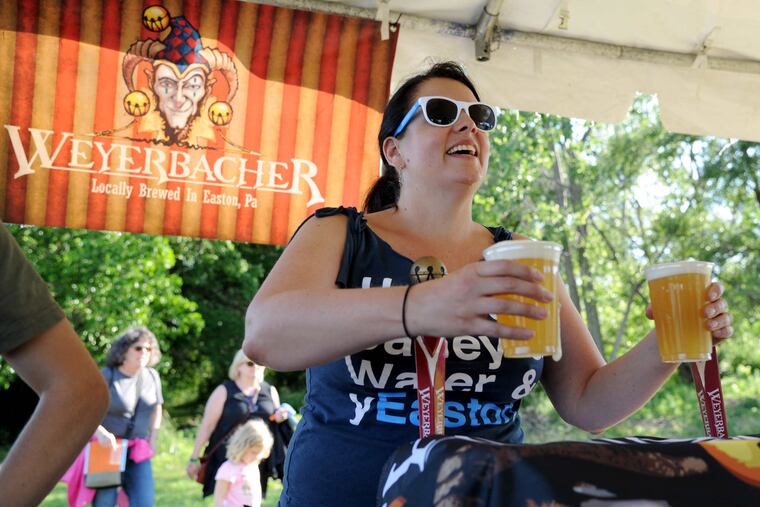Weyerbacher Brewing files for bankruptcy as part of restructuring
One of the earliest breweries in the region Weyerbacher has filed for Chapter 11 bankruptcy as the company tries to clean up its debt and jump-start profitability.

Weyerbacher Brewing Co. Inc., the 24-year-old Easton business known for its big Belgian-style brews, is restructuring its operations.
The company on Monday announced it has finalized a partnership with 1518 Holdings LLC, a Philadelphia private investment group that will take a 55 percent ownership stake in Weyerbacher. As part of that restructuring, Weyerbacher on Monday filed for Chapter 11 bankruptcy as the company tries to clean up its debt and jump-start profitability.
“This is the last step in the process to investment,” said Weyerbacher Chief Operating Officer Josh Lampe, who will become president as part of the turnaround. "We were hoping to get through without entering Chapter 11, but the group of investors that we’re working with felt that it was necessary in order to move forward quickly.”
Lampe said Weyerbacher was looking for a partner for the last 18 months as financial issues weighed on the regional brewery competing in a saturated marketplace. In its bankruptcy filing, Weyerbacher said it has between 100 and 199 creditors, with estimated liabilities between $1 million and $10 million.
So while the announcement Monday would appear to be miserable news, Lampe said the restructuring will allow Weyerbacher to accelerate certain projects, including opening additional taprooms and growing its lineup of spirits.
Weyerbacher also plans to do some contract brewing to maximize its Easton facility’s production capacity. Last year, the brewery produced 11,000 barrels in Easton, far below the facility’s 30,000-barrel capacity and an underutilization that hurt the operation financially. Lampe said Weyerbacher expects to boost production to 20,000 barrels this year. Weyerbacher plans to do some brewing for Funk Brewing Co. of Emmaus, with more deals likely to follow to help improve cash flow, he noted.
“We’ve got a lot of really good things that are happening, and this restructuring allows us to really get going with some of the projects we’ve been planning for a while,” Lampe said.
While Weyerbacher had a couple layoffs a few months ago, Lampe said no job cuts are planned as a result of the restructuring. The company employs about 30 full-time and 20 part-time workers. In addition, Weyerbacher founder Dan Weirback, also listed as one of the company’s largest creditors, will continue to consult with the brewery as he has for the last three years.
Weyerbacher’s restructuring, however, reflects the reality of the supercompetitive, capital-intensive craft beer industry. The number of U.S. breweries surged past 7,000 last year, according to the Brewers Association, at a time when craft beer’s growth rate is stabilizing. That means the brewers already operating and the ones soon to open are facing a fiercely competitive landscape to quench America’s thirst.
Paul Gatza, senior vice president of the Brewers Association’s Professional Brewing Division, said the group saw more than 230 U.S. breweries close last year, still a relatively small number when considering the more than 1,000 openings. The competition, he said, has been tough for breweries the size of Weyerbacher.
On one side, breweries like Weyerbacher get hit by larger, more efficient breweries that have a strong connection to chain retailers. Then on the other side, regional breweries are getting pressured by the emerging trend of smaller operators that are capturing the consumers’ attention.
“Regionals have been getting squeezed from above and below, so it has been tough for a lot of them,” Gatza said.
Gatza noted that Weyerbacher is not the only brewery that has reached this point in the road, though typically a deal would happen before the bankruptcy filing. In another case Gatza recalled, New Hampshire’s Smuttynose Brewing Co. last year was sold at a public auction to its largest lender, Provident Bank, before the bank then unloaded the brewery to an investment firm.
As for Weyerbacher’s plan of opening more taprooms — the company has one in Easton and another in New Hope — Gatza said that should help the company rake in more cash over the bar. But the environment is still tough, one where breweries have to continually remake themselves, retiring old brands and bringing in new ones.
“It’s tough,” he said. “You have to be able to reinvent yourself these days.”
______
Morning Call reporter Jon Harris can be reached at 610-820-6779 or at jon.harris@mcall.com